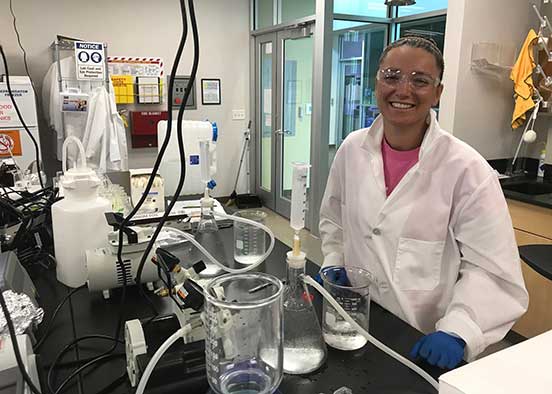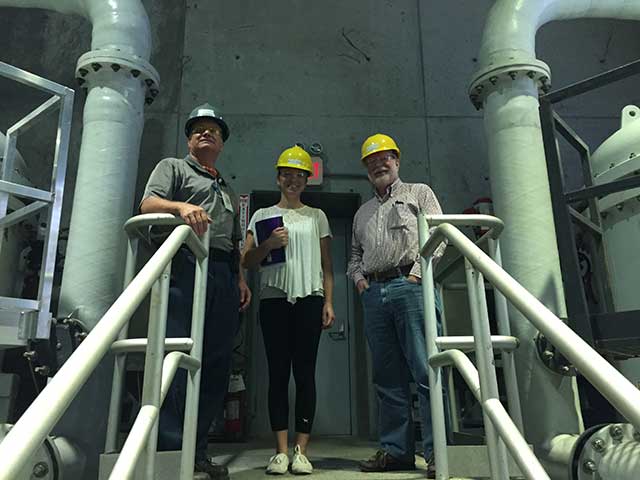She may have been the first FGCU grad student to Zoom her way to a master’s degree.
“Having to present my thesis defense virtually was both easier and more difficult at the same time,” Harvey says. “I didn’t feel as nervous, because I was behind a screen, but there is a special energy in the room that seems to make you perform better and sharpen your focus when you present to a large crowd in person — and I missed that.”
Nevertheless, she remains grateful that technology was available to help her reach that academic apex and achieve a measure of closure on March 31.
“I think this could be the way of the future with some fine tuning. The capability to present and reach fellow students and engineers worldwide is truly what science is all about.”

Harvey should know. A lifelong fascination with marine life and science drew her to Florida from Massachusetts, where she grew up. Her family often vacationed on nearby Sanibel Island, so she was familiar with the area and with Florida Gulf Coast University.
“I have always loved marine life and the beach and knew that if I was going to pursue a degree in marine science, Florida was the place to be,” she says. “When I toured FGCU I was able to visit the Vester Marine & Environmental Science Research Field Station and I fell in love with the idea that I would one day be able to take classes there and do marine research.”
Even so, Harvey could hardly have imagined then the myriad opportunities she would have throughout her FGCU career to collaborate on critical research alongside world-class faculty. From freshman year in 2014-15 to her final semester, she delved into a diverse array of research subjects: gopher tortoises with biology professor Phil Allman; nanoparticles and cancer cells with chemistry professor Ju Chou; and Astorina starfish with ecology professor Hidetoshi Urakawa.
“I originally got involved with research because I knew that was what would separate me from the rest of the pack when it came to applying for graduate school,” Harvey says. “I never said no when professors would ask me to be part of a research project. I love research and collecting data, and it was my hope to do this for a living once I graduated.”
While pursuing her engineering master’s, she and her graduate advisor and mentor, Eminent Scholar in Hydrology Thomas Missimer, were able to arrange a partnership with the Tampa Bay Water Desalination Plant to allow Harvey to take samples and analyze the water quality through different stages within the plant. The study incorporated her water knowledge with her engineering focus.

“Her work on the Tampa Bay Water Desalination Plant has been critical in determining the treatment problems that have historically occurred at this facility,” says Missimer, who is also director of FGCU’s Emergent Technologies Institute. “Her work as a student has been exceptional. She has already published one first-author research paper in an international journal and has two additional papers in review. These papers will likely be accepted for publication soon. In addition, she is working with me on another paper for publication.”
Harvey has equally glowing gratitude for her mentor as she transitions from the scholastic scene to the working world.
“Dr. Missimer has taught me more in the last two years than I think I have learned in my whole life,” she says. “He saw potential in me even when I was intimidated at first with starting a master’s degree in a different field. He has been able to help me sharpen my research and critical thinking skills, and help me focus on writing, as research that is never published is not useful to anyone. My opportunities for the future have grown tremendously because of him, and I am forever grateful for his tutelage.”
As 23-year-old Harvey faces that future, she’s aiming for a job in her field that would keep her in the region. She had dreamed about moving to Florida since she was a little girl. Fortunately for her, the interests she outlines on her LinkedIn profile align with some of the most critical environmental issues challenging Southwest Florida: the functioning of ecological communities and how they interact and are affected by manmade developments; and solving problems related to beach erosion, wastewater management and watersheds.
“Through all of my many experiences and research opportunities, I have actually become more open minded towards the idea of pursuing many different careers and potential jobs,” Harvey explains. “I’ve truly enjoyed each research study I have been a part of, and they are all very different. The possibilities are endless!”[/vc_column_text][vc_column_text]
Natalie Harvey’s Tips for a Virtual Thesis Defense
- Practice using the computer and showing your PowerPoint on the online platform.
- Talk to your committee members well before you present to get a feel for what they are expecting to see/hear.
- Practice making eye contact with your computer camera if you are on the screen. It is easy to start reading the slides when they are right in front of you.
- Be prepared for any question. Doing your defense virtually, your audience becomes a wider array of people with different backgrounds and they may have questions you didn’t expect.
- Avoid shoving too much information into your presentation. It’s difficult because you have to put years of work into a 30-minute presentation, but it’s better to focus on the main goal of your study and have the audience understand the reason why your research is relevant and important.